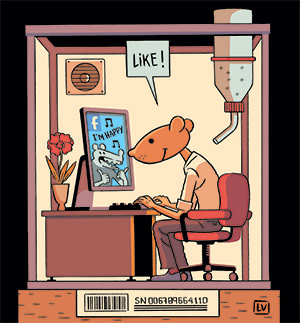Facebook: why we’re all lab rats now

Roula Khalaf, Editor of the FT, selects her favourite stories in this weekly newsletter.
Facebook is going to kill the president. Seriously; the evil technologists are running psychological experiments on our news feed to play with our emotions. I’m telling you; it is Homeland all over again. Or to rephrase that for an older generation: we are the Manchurian Candidate.
Why won’t you believe me? They are playing with your brain. That animated gif of two puppies frolicking in the park – it’s actually the signal to grab your gun and commit acts of terror. Zuckerberg – that’s a North Korean name, isn’t it?
There is now a predictable arc to a Facebook backlash. The site sneakily does something that users don’t like: a counterblast ensues, Facebook apologises, retreats a little, a few months pass. Facebook does it again. It is a curiosity that an organisation so built upon empathy has so little itself. This week’s furore followed news that Facebook had secretly run psychological experiments on 700,000 users; tampering with their news feed to expose them to more positive or negative posts and tracking the impact on their activity. It is easy to construct an alarmist narrative about this. If it can manipulate your mood (which the tests show it could) then with its huge reach, Facebook has worrying power.

The tests showed positive posts produced more positive responses, while negativity provoked the opposite. The research calls this “emotional contagion”. Cripes, Facebook is creating emotional contagion – those evil bastards; they want to kill the president.
Over recent years, users of free web services such as Facebook have got used to the idea that we are the product – the eyeballs being sold to advertisers, in exchange for these wonderful free tools. Now it turns out, we are mere lab rats, lesser creatures being toyed with by the great technologists. To read some comments, one might imagine it was running variants of the Milgram test, subliminally encouraging users to deliver fatal electric shocks to their neighbours.
The reality is less shocking once you know that Facebook routinely tampers with what you see in your default news feed to keep you clicking and make itself a more profitable business. Facebook, like all content-based sites (the FT included), is in the business of keeping you on its pages.
It is reasonable to ponder on Facebook’s power. People accept that businesses will manipulate them into purchases. It is a staple of the retail model. What makes this seem more serious is less the site’s power or the vast store of data it already holds on us. It is that users are unaware of being subtly programmed. Manipulating its users is risky territory, especially when you consider that we are the product Facebook is delivering, so there is every reason to be vigilant. We can also all imagine the risks if the company were tempted to use its immense power subliminally to influence political debates. (Facebook has already tried this once, albeit fairly benignly, using “nudge” techniques to encourage people to vote in the last US election.) The fears are plain but while the potential risk is huge, the real threat, for now, is not. Even so, Facebook’s leaders would be smart to avoid trying to improve the world and stick to boosting its bottom line.
But in the meantime, it may be more interesting to speculate on how Facebook will use this research. Will it conclude that its interests are served by accentuating the positive? Feeling down? Let Facebook pick you up. Look – here’s some friends from Maine roasting marshmallows. And here’s a local school choir singing Pharrell Williams’s “Happy” (Don’t worry, wherever you live there is a local school performing “Happy”.)
Or perhaps, since what Facebook is really looking for is a reaction, it will be content with any posts that secure an emotional response; anything that makes you want to share, to act. Look, here’s those kidnapped Nigerian schoolgirls; here’s a famine. Do something; share this post. Together we can like away world hunger.
There are those who will be unhappy with their new lab-rat status but few will exercise their one power and quit the site. But then presumably there are rats who will tell you that it is really dirty in the sewers and that they would miss their mates if they left the lab.
robert.shrimsley@ft.com; Twitter: @robertshrimsley
Illustration by Lucas Varela
Comments